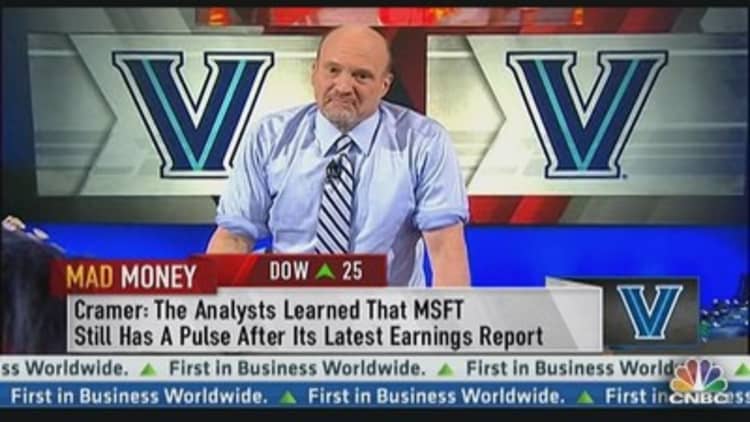
(Having trouble with the video? Click here!)
As you do homework on your stock picks, Cramer said you have to be careful. The most sought after insights can sometimes be misleading.
And with the Mad Money Back to School Tour underway, Cramer thought there was no better time to illustrate the point.
"Unlike a college library which is full of reliable research, Wall Street is just the opposite," Cramer said. "Street analysts get it wrong."
To illustrate his point Cramer pointed to Microsoft, "a company that was, for the most part, written off and left for dead as one more casualty of declining P.C. sales before it reported last Thursday," Cramer said.
However Microsoft issued results and those results not only exceeded expectations they stunned some investors.
Specifically, earnings rose to $6 billion, or 72 cents per share, from $5.1 billion, or 60 cents per share, in the year-ago quarter. Revenue improved 18 percent to $20.49 billion from $17.41 billion a year ago.
Had you listened to analysts' consensus you expected the company to report earnings of 68 cents a share on $20.5 billion in revenue, according to a consensus estimate from Thomson Reuters.
Then, in the span of only 5 days Microsoft shot more than 10% higher as the Street factored in the stronger than expected results.
What's the takeaway?
1. Even the best analysts get it wrong.
Cramer said both Heather Bellini at Goldman Sachs and Rick Sherlund at Nomura missed the mark, and they're both top in their class.
"Heather is fantastic, and Rick actually helped bring Microsoft public back in the day," Cramer said. "Yet these two very smart analysts both simultaneously downgraded Microsoft back on April 11th based on weakness in the PC market."
In part that's because Wall Street analysis is one part science and another part art. "To really nail a quarter, you have to guess not just what numbers will be, but also how the stock will react. Those are two separate things," Cramer said.
------------------------------------------------------------------
Read More from Mad Money with Jim Cramer
Cramer: Why is Market Clobbering These Stocks?
Green Trucks Turning a Corner
Cramer: This Pullback a Total Gift
------------------------------------------------------------------
2. Analysts can get preoccupied with marquis issues.
"There was another downgrade before the quarter," said Cramer, "from Bank of America's Kash Rangan, and this was the most painful of them all. BofA got the thesis about the direction of the stock dead wrong."
Cramer says in this case, the analyst couldn't reconcile the negative impact declining PC sales should have had on Microsoft. For all of 2012, 352 million PCs were sold, down 3.2 percent from 2011.
"But in the process, BofA forgot all of the other divisions—the cloud business, online services, and entertainment and devices, all of which exceeded Wall Street's forecasts," Cramer said.
3. The analysis can already be baked in, before it comes out.
Cramer said another important takeaway is that although declining PC sales are certainly an issue for Microsoft, the Street had factored that into share price long before the analysts issued their downgrades.
4. Non-consensus analysis always warrants attention
Sometimes the outlier view is right. In the case of Microsoft, "Mike Moerdler at Bernstein Research nailed it," said Cramer. Right before the quarter he wrote, 'we believe the current share price embeds an unrealistically bad scenario of no to negative perpetual growth, billions of dollars in annual cash drain from search and mobile into perpetuity, and tens of billions of additional value destruction through ill-fated acquisitions and investments." In other words he said the consensus view was just too bearish.'
What's the bottom line?
"Even the best analysts can get it wrong. Therefore, investors have to do their own homework and not rely solely on the analysis of others," Cramer said.
And as in the case of Microsoft, Cramer said if you find the analysis hard to swallow don't immediately second guess yourself. The outlier analysis may be the most prescient.
Call Cramer: 1-800-743-CNBC
Questions for Cramer? madmoney@cnbc.com
Questions, comments, suggestions for the "Mad Money" website? madcap@cnbc.com



